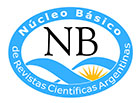Evidence on the cognitive Appropriation of Inventions of the Argentine 'CTI' System by Private and Foreign Owners
Evidencia sobre la apropiación cognitiva de las invenciones del sistema CTI argentino por parte de titulares privados y extranjeros
Keywords:
Economic Development; Exogenous Industrialization; Blind Technology Transfer; Knowledge Economy; Cognitive ExploitationAbstract
This article offers systemic empirical evidence about a decoupling that is called “cognitive appropriation”, which consists in the fact that patentable inventions originated in the public financing of Argentina's science, technology and innovation (STI) system end up having as owners, to a large extent, to private and foreign actors. Methodologically, the research is based on the crossing of data declared by researchers responsible for projects presented to the Agencia I+D+i with the information of 932 patent applications arising from the WIPO database and, in a complementary way, on the systematization of regulations and specific literature. It was found that more than half of the patents applied for are not owned by the public bodies that financed the research. The phenomenon of cognitive appropriation consists of patents applied for by foreign firms and institutions and accounts for 23% of total applications. In addition, it should be noted that the patents applied for owned by public institutions were mostly processed at the Argentine office, while more than 90% of patent applications whose owners were foreign actors have been submitted in foreign offices.
Downloads
References
Aggio, C.; Erbes, A.; Lengyel, M. y Milesi, D. (2017). Experiencias internacionales en asociatividad público-privada para la innovación. Documento de Trabajo N° 9. Centro Interdisciplinario de Estudios en Ciencia, Tecnología e Innovación. Ciudad Autónoma de Buenos Aires. .
Álvarez, R.; Benavente, J. M.; Contreras, C. y Contreras, J. L. (2010). Consorcios Tecnológicos en América Latina: Una primera exploración de los casos de Argentina, Chile, Colombia y Uruguay. Inter-American Development Bank. NOTAS TÉCNICAS # IDB-TN-127.
Aoki, K. (1998). Neocolonialism, Anticommons Property, and Biopiracy in the (Not-so-Brave) New World Order of International Intellectual Property Protection. Indiana Journal of Global Legal Studies, 6, (1), Art. 2.
Arrow, K.J. (1962). Economic welfare and the allocation of resources for invention. The Rate and Direction of Inventive Activity: Economic and Social Factors, ed. Univ.-Natl. Bur. Comm. Econ. Res., Comm. Econ. Growth Soc. Sci. Res. Counc., pp. 609–26. Cambridge, MA: NBER.
Arundel, A. (2001). The relative effectiveness of patents and secrecy for appropriation. Research Policy, 30, 611-624.
Arza, V. (2013). ¿Cómo mejorar el impacto socioeconómico de la colaboración público privada en I+D en el sector de biotecnología agropecuaria? El caso del desarrollo de un algodón resistente a la plaga más importante del Mercosur. Red Mercosur, Documento de trabajo N° 2.
Ben-Atar, D. (2004). Trade secrets: Intellectual piracy and the origins of American industrial power. New Haven: Yale University Press.
Biagioli, M. (2006). From Print to Patents: Living on Instruments in Early Modern Europe. History of Science 44 (2), 139-186. Recuperado de DOI: 10.1177/007327530604400202
Bolaño, C. (2005). Economía política y conocimiento en la actual reestructuración productiva. En Bolaño, C., Mastrini, G. y Sierra, F. (eds.) (2005): Economía Política, Comunicación y Conocimiento. Una perspectiva crítica latinoamericana. Buenos Aires: La Crujía.
Chang, H.-J. (2013). Patada a la escalera: La verdadera historia del libre comercio. Ensayos de Economía, 23(42), 27-57. Recuperado a partir de https://revistas.unal.edu.co/index.php/ede/article/view/41244
Chang, H.-J. (2001). Intellectual property rights and economic development: Historical Lessons and Emerging Issues. Journal of human development, 2(2), 287-309.
Chudnovsky, D. (1999). Políticas de ciencia y tecnología y el Sistema Nacional de Innovación en Argentina. Revista de la CEPAL 67, abril 1999.
Cimoli, M., Dosi, G., y Stiglitz, J. (2009). Conclusion. En Cimoli, M., Dosi, G., & Stiglitz, J. (eds.) Industrial policy and development: The political economy of capabilities accumulation. Oxford University Press.
Cimoli, M.; Ferraz, J. C. y Primi, A. (2005). Science and technology policies in open economies: The case of Latin America and the Caribbean. CEPAL, Santiago de Chile. Serie Desarrollo Productivo N° 165.
Codner, D.; Becerra, P.; Díaz, A. (2012a). Blind Technology Transfer or Technological Knowledge Leakage: a Case Study from the South. Journal of Technology Management and Innovation 7(2), 184-195.
Codner, D.; Becerra, P.; Díaz, A. (2012b). La transferencia tecnológica ciega: desafíos para la apropiación del conocimiento desde la universidad. Redes 18 (35), 161-171.
Codner, D.; Perrotta, R. M. (2018). Blind Technology Transfer Process from Argentina. Journal of Technology Management and Innovation 13(3): 47-53. Recuperado de https://doi.org/10.4067/S0718-27242018000300047
Cohen, W. M., Nelson, R. R., & Walsh, J. P. (2000). Protecting their intellectual assets: Appropriability conditions and why us manufacturing firms patent (or not). Cambridge (MA): National Bureau of Economic Research.
Coriat, B. (1985). El taller y el cronómetro. Ensayo sobre el taylorismo, el fordismo y la producción en masa. México DF: Siglo XXI.
Del Castillo, L. (2004). Diversidad biológica y biopiratería: el caso de la maca. Debate Agrario: Análisis y alternativas (37). Lima: Centro Peruano de Estudios Sociales – CEPES.
Drahos, P. y Braithwaite, J. (2002). Information Feudalism: Who owns the knowledge economy? Nueva York: The New Press.
Eglash; R, Croissant,R; Di Chiro, G; Fouché, R (2004). Appropriating Technology: Vernacular Science and Social Power. Minneapolis/London: University of Minnesota Press.
Erbes, A. y Suarez, D. (2016). Repensando el desarrollo latinoamericano. Una discusión desde los sistemas de innovación. UNGS, Buenos Aires. ISBN: 978-9-87630-244-9.
Fernández-Arias, E.; Sabel, C.; Stein, E. y Trejos, A. (2016). Two to tango: public-private collaboration for productive development policies. Inter-American Development Bank. Washington, D.C.
Fisher, E. (2012). How Less Alienation Creates More Exploitation? Audience Labour on Social Network Sites. TripleC: Communication, Capitalism and Critique 10(2), 171-83. Recuperado de http://www.triple-c.at/index.php/tripleC/article/view/392/357
Fuchs, Ch. (2010). Labor in informational capitalism and on the Internet. The Information Society 26(3), 179-96.
Fumagalli, A, Lucarelli, S & Musolino, E y Rocchi, G (2018). El trabajo (labour) digital en la economía de plataforma: el caso de Facebook. Hipertextos, 6(9), 12-41. Recuperado a partir de https://revistas.unlp.edu.ar/hipertextos/article/view/7644. Hipertextos, 6(9), 12- 40.
Goldstein, D. (1989). Biotecnología, universidad y política. México, Siglo XXI Editores.
González, N., & Nieto, M. (2007). Appropriability of innovation results: An empirical study in Spanish manufacturing Firms. Technovation, 27, 280-295.
Gould, D. M. y Gruben, W. C. (1996). The Role of Intellectual Property Rights in Economic Growth. Journal of Development Economics 48(2), 323-350.
Herrera, A. (1971). Los determinantes sociales de la política científica en América Latina. Política científica explícita y política científica implícita. Diario “La Opinión", Buenos Aires, 14 de julio de 1971.
Johns, A. (2010). Piracy: The Intellectual Property Wars from Gutenberg to Gates. Chicago: University of Chicago Press.
Kreimer, P. y Thomas, H. (2006). “Production des connaissances dans la Science périphérique: l’hypothèse CANA en Argentine”. In: J. B. Meyer y M. Carton: La société des savoirs. Trompe-l’oeil ou perspectives? París, L’Harmattan.
Kreimer, P.; Zukerfeld, M. (2014). La explotación cognitiva: Tensiones emergentes en la producción y uso social de conocimientos científicos tradicionales, informacionales y laborales. En P. Kreimer, H. Vessuri, L. Velho y A. Arellano (coords) (2014). Perspectivas latinoamericanas en el estudio social de la ciencia, la tecnología y el conocimiento. Buenos Aires: Siglo XXI. P. 178-193.
Levin, R. C., Klevorick, A. K., Nelson, R. R., Winter, S. G., Gilbert, R., & Griliches, Z. (1987). Appropriating the returns from industrial research and development. Brookings Papers on Economic Activity, 3, 783-831.
Liaudat, S. (2021). Stevia: conocimiento, propiedad intelectual y acumulación de capital. Buenos Aires: Prometeo.
Liaudat, S.; Terlizzi, M.S.; Zukerfeld, M. (2020). Piratas, virus y periferia: la apropiación impaga de conocimientos en el capitalismo, del PLACTS a la COVID-19. Argumentos, 22. Recuperado de https://publicaciones.sociales.uba.ar/index.php/argumentos/article/view/5966
Lugones, G.; Codner, D.; Becerra, P.; Pellegrini, P.; Rossio Coblier, P.; Martin, D.; Kababe, Y.; Pizzarulli, F.; Bazque, H.; Giudicatti, M. y Gutti, P. (2015). Dinámica de la transferencia tecnológica y la innovación en la relación Universidad – Empresa. Informe Final de Proyecto. UNQ – CIECTI. Recuperado de http://www.ciecti.org.ar/wp-content/uploads/2016/09/CIECTI-Proyecto-UNQ.pdf
Lund, A. y Zukerfeld, M. (2020). Corporate´s use of openness: profit for free? Londres: Palgrave MacMillan.
May, Ch. y Sell, S. K. (2006). Intellectual property rights: a critical history. Boulder, Colorado: Lynne Riener Publishers.
Posner, R. (2005). Intellectual Property: The Law and Economics Approach. Journal of Economic Perspective, 19(2), 57-73.
Rikap C. (2020). Amazon: A story of accumulation through intellectual rentiership and predation. Competition & Change. June 2020. Recuperado de DOI:10.1177/1024529420932418
Rikap, C. & Lundvall, B.-A. (2020). Big tech, knowledge predation and the implications for development. Innovation and Development. Recuperado de DOI: 10.1080/2157930X.2020.1855825
Romer, P. (1993). “Two Strategies for Economic Development: Using Ideas and Producing Ideas.” In Proceedings of the World Bank: Annual Conference On Development Economies (1992), edited by Lawrence H. Summer and Shekhar Shah, 63-115. Washington DC: World Bank.
Sábato, J. A., & Botana, N. R. (1968). La ciencia y la tecnología en el desarrollo futuro de América Latina. Revista de la Integración, 1(3), 15-36.
Shiva, V. (1997). Biopiracy: The Plunder of Nature and Knowledge. Boston, MA: South End Press.
Srnicek, N. (2017). Platform capitalism. Cambridge: Polity Press. 171 p.
Varian, H. (1998). Markets for Information Goods. Recuperado de https://people.ischool.berkeley.edu/~hal/Papers/japan
Vessuri, H. (1994). La ciencia académica en América Latina en el siglo XX. Redes, 1, (2), diciembre 1994, 41-76.
Yansen, G.; Dolcemáscolo, A. (2017). Informational cognitive exploitation: Concealed relationships behind prosumers' activity on World Wide Web. Sociologia del Lavoro, 145, 3-2017, 61-77.
Zukerfeld, M. (2017). Knowledge in the Age of Digital Capitalism: An Introduction to Cognitive Materialism. Londres: University of Westminster Press.
Downloads
Published
How to Cite
Issue
Section
License

This work is licensed under a Creative Commons Attribution-NonCommercial-ShareAlike 4.0 International License.
Manuscript acceptance by the Journal implies the simultaneous non-submission to any other journal or publishing house, and the non-exclusive transmission of the author´s patrimonial rights in favor of the editor, who allows the post-print version use, under the Licencia Creative Commnos Atribución-NoComercial-Compartir Obras Derivadas Igual 4.0 Internacional (CC-BY-NC.SA 4.0) (http://creativecommons.org/licences/by-nc-sa/4.0/deed.es). Articles can be shared, copied, distributed, modified, altered, transformed into a derivative work, executed and publicly communicated, provided a) the authors and the original publication (Journal, Publisher and URL) are mentioned, b) they are not used for commercial purposes, c) the same terms of the license are maintained.
It is hereby stated that the mentioned manuscript has not been published and that it is not being printed in any other national or foreign journal.
The authors hereby accept the necessary modifications, suggested by the reviewers, in order to adapt the manuscript to the style and publication rules of this Journal.









